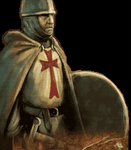The concept of men selling their lives as dearly as possible forms an honoured part of of most national histories, Great Britain being no exception. It is also the basis of much military tradition. However the facts are that although all armies (remember Saddams Revolutionary Guard?) talk of fighting to the last man, such events are the exception rather than the rule. The phenomenon of the Last Stand can only be seen in a highly motivated environment, during times of total war or when feelings are very high. The phenonmenon has appeared time and time again throughout history, the earliest recorded example being the stand at the pass of Thermopylae by the Greeks against the Persians in 480BC when King Leoindas of Sparta and his bodyguuard of 300 Spartans refused to surrender and fought to the last man.
At the Battle of Hastings (see earlier post - The White Dragon of the English) when the rest of the English army had fled, King harolds housecarls fought to the bitter end in defence of their king and homeland.
During the Crusades the Knights Templar made it common knowledge to both friend and foe that they neither gave or accepted quarter (mercy/surrender). The Muslims reacted accordingly and after the Battle of Hattin in 1187AD some 200 captured Templar and Hospitaller Knights were executed immediately by beheading ( Sharia Law, anyone?).
At Marston Moor and Naseby during the English Civil War there were Royalist regiments who went down fighting rather than surrender to an enemy and way of life that they loathed and despised.
Remember that in these eras there was no disgrace in an honourable surrender (often offered) and that Last Stands were rare.
This started to change in the nineteenth and twentieth centuries in the ages of permanent warfare and global expansion, and it is during these times that the Last Stand became a regular feature of war.
Much depends on the motivation of the men invlolved. Where does it come from? Anger? Fear? Espirit de Corps? Tradition? Beliefs? Loyalty? Hope of relief? Or self-sacrifice to help others?
Another factor to consider: Armies do not fight to the last man, nor do large formations. The units that do so are always relatively small compared to the overall conflict or battle. In other words a mans primary loyalties lie with those nearest to him. His "family" and friends - anything outside this group are relative strangers and therefore have little or an impersonal loyalty due.
Some British examples of this:
The Parachute Regiment at Arnhem (17th - 20th September 1944)
The 24th Regiment of Foot (later the South Wales Borderers) at Rorkes Drift and Isandlwana (22nd January 1879)
The 2nd Battalion of The Rifle Brigade at Outpost Snipe during the Second Battle of El Alamein (27th October 1942)
The 5th Battalion of the Hampshire Regiment at Sidi Nsir in Tunisia (26th February 1943)
The 2nd Battalion West Yorkshire Regiment at the Admin Box in Burma ((6th - 25th February 1944)
The Gloucestshire regiment, Royal Northumberland Fusiliers and the Royal Ulster Rifles at the Imjin in Korea (22nd - 25th April 1951)
"L" Battery Royal Horse Artillery at Nery (31st August 1914)
(Just out of interest, there were English, Scots and Irishmen fighting for freedom at the Alamo) (23rd February - 6th March 1836)
These battles have passed into British history because of the courage and resolve of those making the stand. With one exception the stand benefited the cause of those who made it. Most obviously, a rigid stand weakened the enemy, disrupted his plans and cost him time - all factors that could be used against him in subsequent engagements, both military and political. Even where a stand was "unsuccessful" the foes small, but frequently expensive tactical victory, was counter-productive as it would engender a burning desire for revenge among the comrades of the men and often in their homeland as well - important from a pyschological warfare aspect.
I will endeavour to cover some of these heroic British military actions over the next few months as most of them are not remembered today - yet in their day they were events that helped shape the British Nation.
Sir Winston Churchill (1874-1965)
"A nation which has forgotten its past can have no future."
Subscribe to:
Post Comments (Atom)



No comments:
Post a Comment